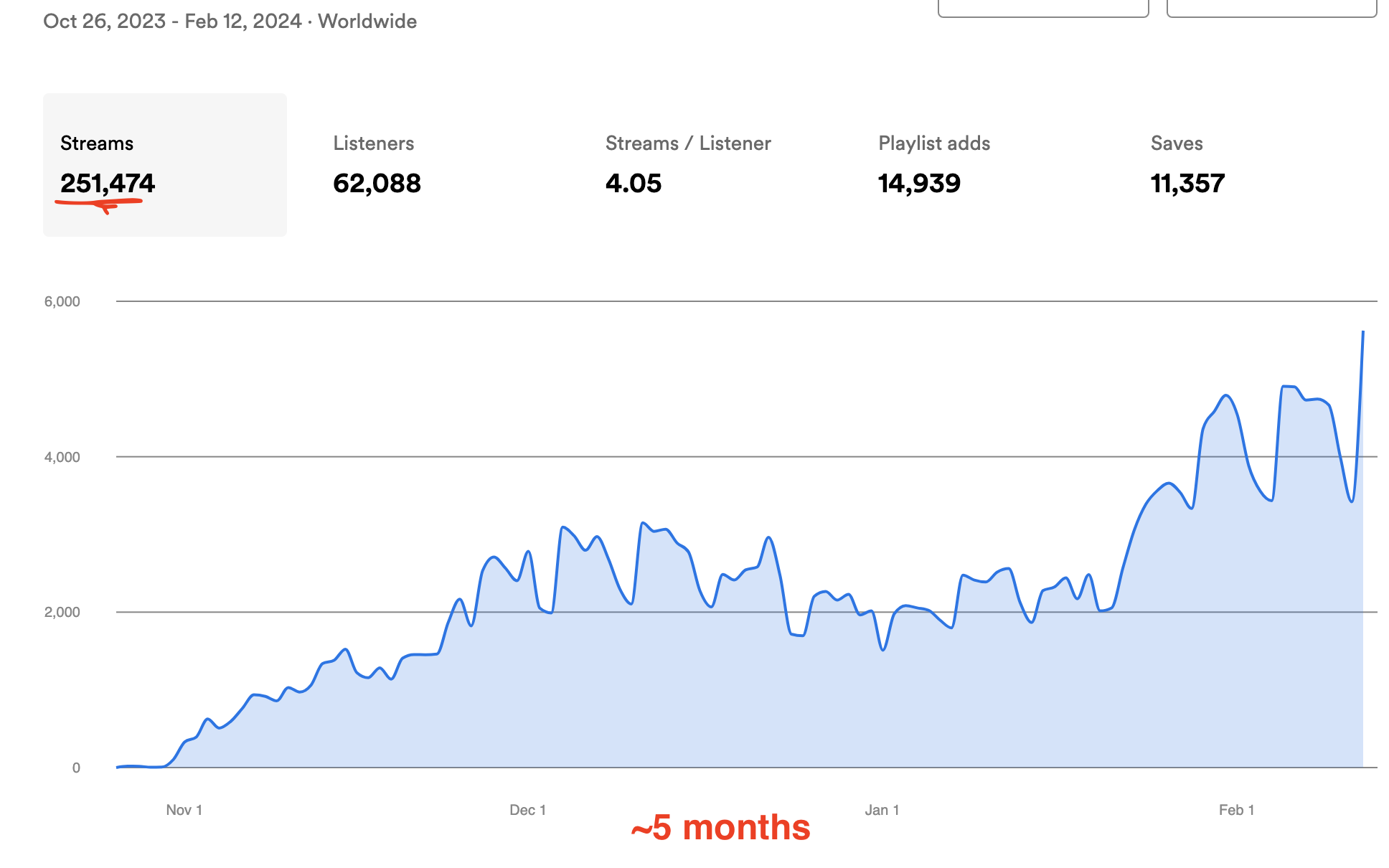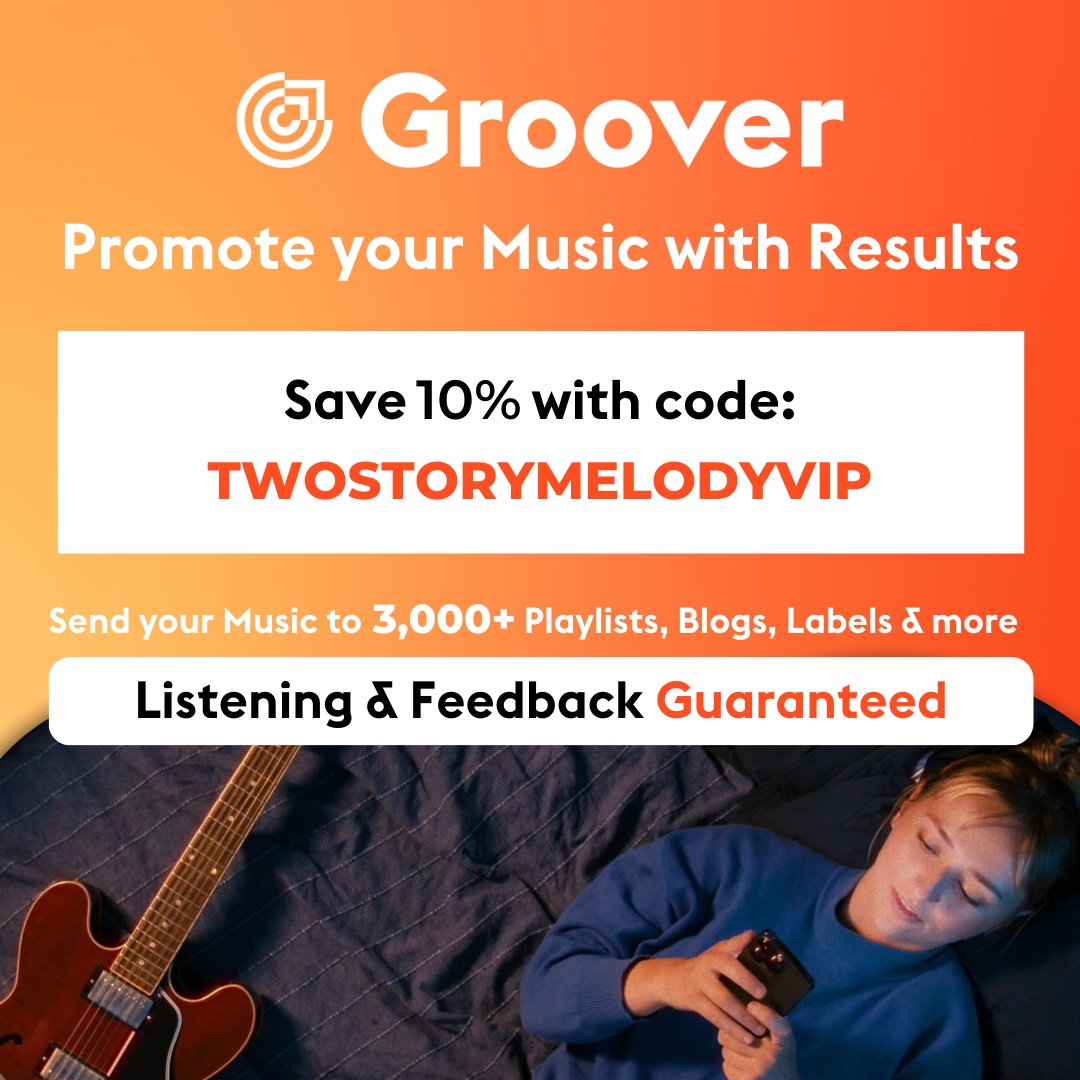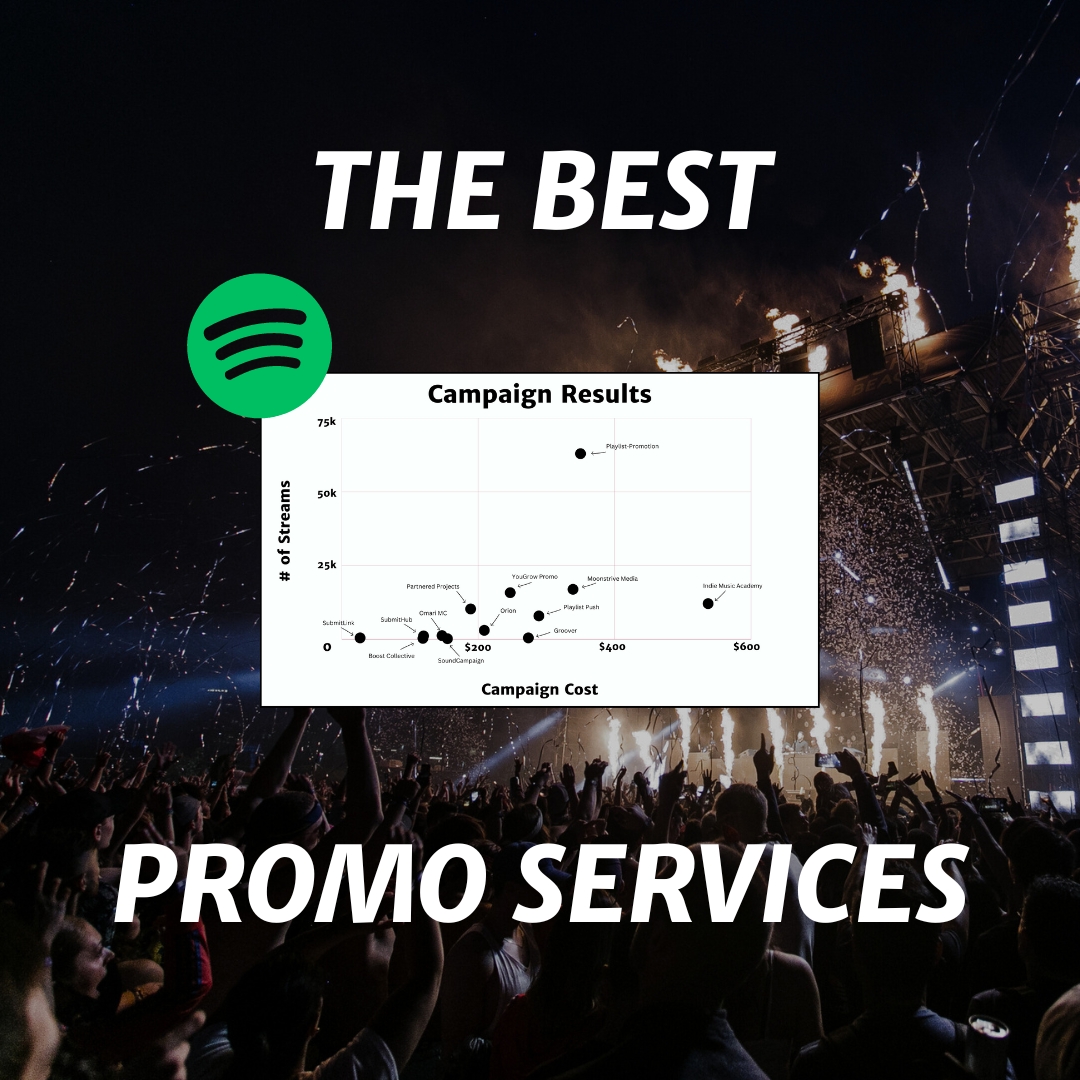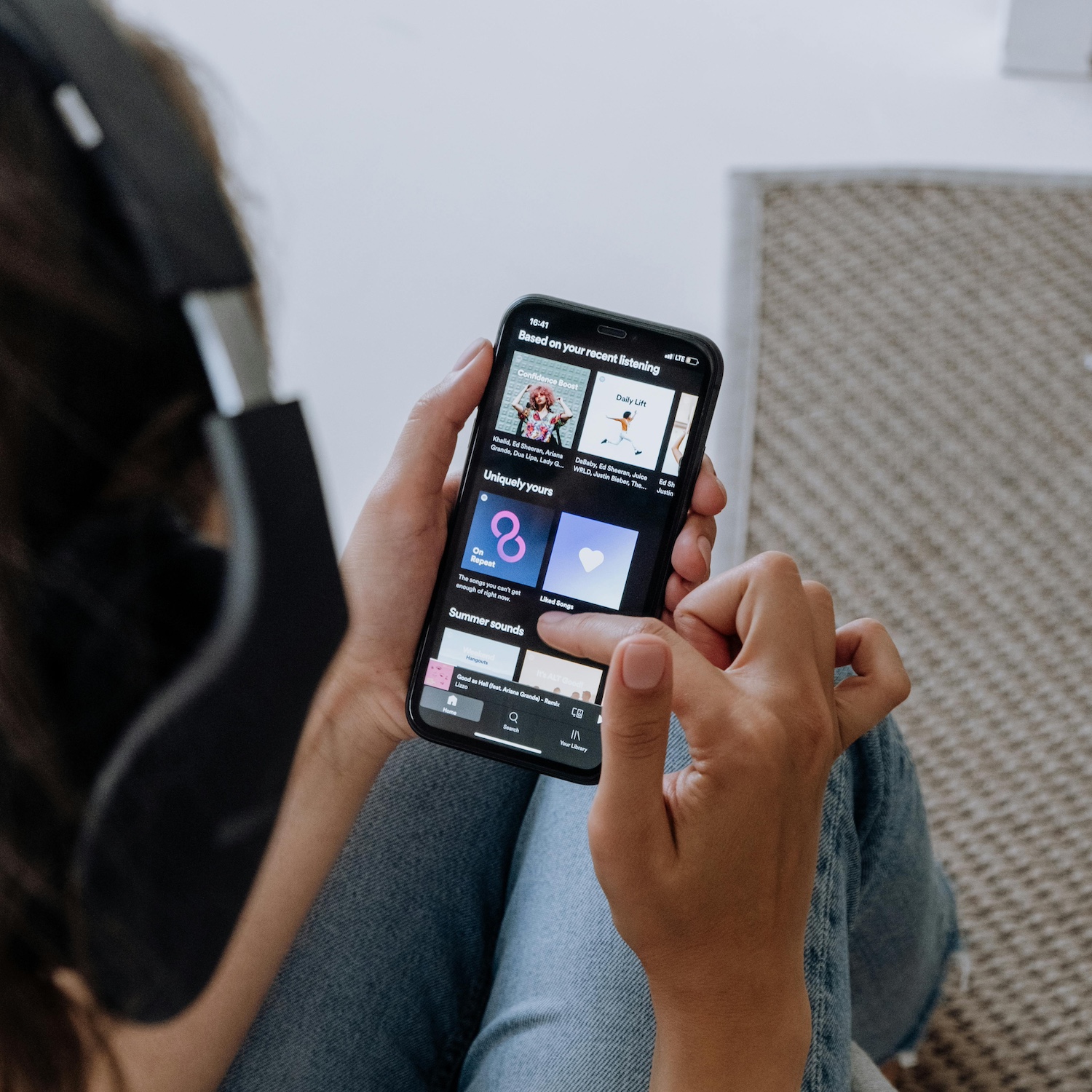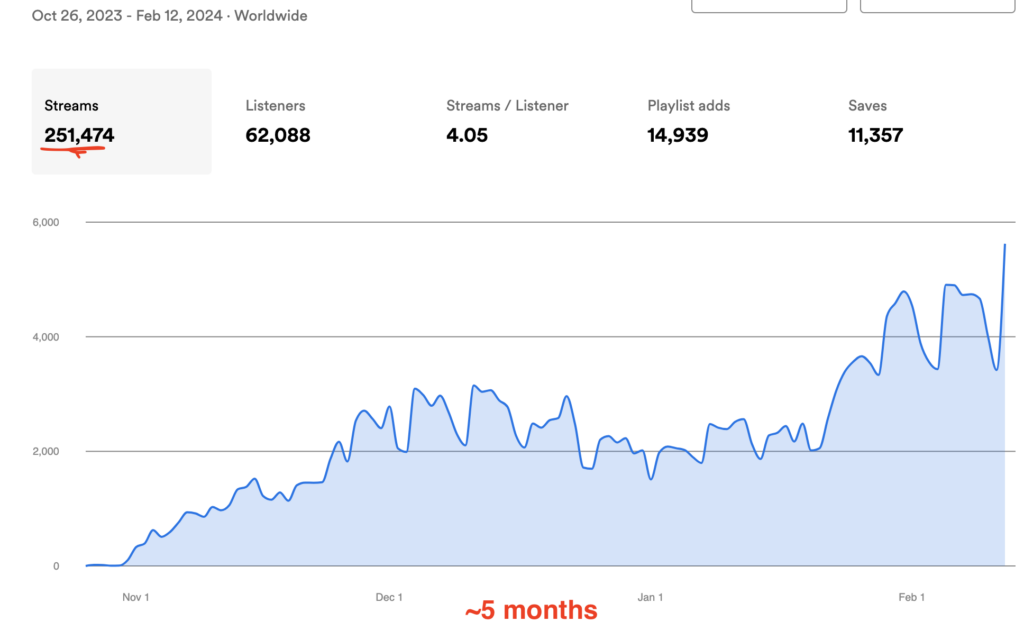Spotify has been the most popular music streaming platform for the last few years, and with over 551 million users and 220 premium subscribers, it is by far surpassing Amazon, Apple, and YouTube Music. What is Spotify’s secret?
The Swedish startup entered the market in 2008 to address piracy issues in the music industry by offering free streaming services for its users and the best listening experience for paying subscribers while also paying artists for their creative work. The company sees the reason for its success mainly in its personalized approach and ability to create a unique experience for every user, thanks to its advanced algorithms.
Its Daily Mix and Discover Weekly are curated for each listener to offer music they might enjoy, and it is every artist’s dream to get to one of these playlists. Undoubtedly, if you are an indie artist, Spotify is where you can effectively promote your music, grow the follower base, or even get discovered by labels and A&R professionals.
Today, I will get to the bottom of how to increase the number of monthly listeners on Spotify as an indie artist. If you’re following the latest updates from the platform, you should already know that starting in 2024, Spotify will withhold the royalties for any song that doesn’t reach 1,000 streams per year, and even if you don’t get these 1,000 streams within the first month, you will not get paid for this first month’s streams at all.
While I won’t be discussing the policy itself, it’s another reason to get more monthly listeners for your music.
Let’s dive in.
Spotify for Artists
If you don’t have a Spotify for Artists account yet, this is where you should start. Getting your Spotify for Artists profile will first give you credibility (your account will be automatically verified), and furthermore, you will get access to valuable analytics and features, such as playlist add notifications, for free.
You will be able to monitor your fanbase, understand which songs are getting the most views and how your audience interacts with your music, and plan and modify your promotional campaign accordingly.
Once you claim your Spotify for Artists profile, you will want to make sure that it’s optimized to attract your fans. To do this, make sure to include:
- A quality profile picture
- An artist’s bio
- Pinned “Artist’s pick” (like your playlist)
- Your tracks’ artwork
- Links to your social media profiles
Spotify for Artists comes with a number of tools that you can use to promote your music within the platform. Let’s see how you can adopt them to your advantage.
Discovery Mode and other Spotify promotional tools
Spotify has several tools that can help you get more visibility and reach new audiences, and Discovery Mode is one of them. Now, I know this is controversial, and some artists are not fans of that approach due to the 30% commission on the initial stream. That said, there is no upfront payment, and it definitely works for some. It could bring you up to around a 10% increase in your listeners’ number, which, depending on your initial base, might be a significant boost.
If you want some insights on this, Chris Greenwood talks about how Discovery Mode helped him get 100,000 new listeners through Discovery Mode (I know that not everyone has a million Spotify listeners, to begin with, but we all need to start somewhere).
1 Million Monthly Listeners on Spotify feat. @SMARTMUSICBUSINESSVIDEOS
Discovery Mode was introduced to a wider group of users this year after a couple of years of beta, and now it’s available to all artists who meet these criteria.
If you opt-in to be included in Discovery Mode, Spotify will push your songs to Radio auto-plays, and, ultimately, you will see more Radio plays in your Spotify for Artists. Potentially, it sounds great, but it’s not as straightforward; if you want more juicy details, I analyzed Discovery Mode and how it might benefit your fanbase earlier this year.
Another Spotify tool worth noting is Marquee, a sponsored full-screen recommendation of a new release currently available to all Spotify for Artists users across the US, Canada, UK, and Australia. When a listener clicks on Marquee, they can save your music or go directly to your release. The minimum spend on a campaign is $250 (down from the initial $5,000). Is it worth it? Spotify claims Marquee is 10x more cost-effective than social ads, and if you want to know more, check out my in-depth review.
The last of the Spotify instruments I want to mention is Showcase; it’s a Marquee complementary tool that can be used to retarget listeners who interact with your music and also to target new audiences. Spotify Showcase appears as a mobile card on Home, and it’s designed to introduce your music to potential listeners. The minimum spend is $100.
Leverage the Power of Playlists
Create your own playlist
The naked truth is that playlists are the most effective tools to get your music heard by the right audience. I’m not talking only about pitching your music to Spotify playlists, although I will get to that in a moment, too, but building your own playlists is also a powerful way to promote your music.
Creating your own playlist allows you to bring your community together and showcase your music alongside the artists you want to be associated with, and if your playlists become relevant, it will bring you more streams, too. Once you identify which of your playlists might be the most successful, you can start running targeted ads (if you have the budget for it). You can pin your playlists to your homepage for more visibility. When collaborating with other artists on a playlist, you also get more exposure.
Pitch editorial and independent curators’ playlists
Nonetheless, you should still pitch your songs to editorial and user-generated playlists to get more views, widen your fanbase, and increase your chances of getting discovered. Appearing on user-generated playlists actually increases your chances of getting featured on editorial ones, so these playlists you create yourself do help as well.
A good way to identify which playlist to pitch to is by analyzing artists who are similar to you. You can simply search for similar artists on Spotify, target the artists in the same or a similar genre who are on the same level or slightly more advanced in their career level, and track the playlists they are featured on from their profile. Then, search for curators’ contact details and reach out to them.
Some tools, such as Viberate for Artists, will let you compare different artists and playlists that they are featured on, plus you can contact curators directly through the portal. Another great tool for that is artist.tools; it also includes a botted playlist checker and notification systems that will alert you if your songs were added to an artificial playlist.
You can also use submission platforms like SubmitHub, which some people (including Jon) have a love/hate relationship with.
Facebook and Instagram Ad Campaigns
You can start an effective campaign without a huge investment. If the campaign goes as planned and the song performs really well, you can get a lot of streams from it, and while having a big budget will definitely help, you can start a campaign with as little as $500 in your pocket and invest $10-$20 a day.
Facebook has almost 3 billion active users, and hence, Facebook ads are one of the most effective ways to increase your monthly Spotify listeners. It’s worth noting that most of the streams you get happen after the campaign is over, so don’t get discouraged if you don’t see the results in the first few weeks. Maybe you won’t get 12 million streams in the first 12 months (also, you would need to invest a bit more than $500), but the mechanism is the same.
How This Song Got 12 Million Spotify Streams In 6 Months
Thanks to Facebook ads, you can direct relevant listeners to your Spotify profile and use the algorithm to find new fans.
Here’s what you need to do before you start running Facebook ads, step-by-step:
- Set up a personal Facebook profile (if you don’t have one yet).
- Create a Facebook Business Manager account, and link your artist’s page to your account via Facebook Page.
- Create a website link page or a landing page (using services such as Feature.fm, Hypeddit, ToneDen, or a custom website on WordPress or Squarespace).
- Add a Pixel to your landing page (to track the traffic).
Now, you’re ready to create a Facebook campaign and start running ads. If you are just starting out and going DIY, it will probably take a little while you get the targeting right, but trust me, if you do your research and put some work into it, it will pay off.
Email marketing
A mailing list could be a valuable tool to bring new listeners to your Spotify account; emails are more personal than social media, and you don’t depend on the mercy of ever-changing algorithms to get in front of your audience. To create a mailing list, you need to register with an email marketing provider, such as Mailchimp, ConvertKit, or Substack.
There are two types of campaigns: the announcement list and the discussion list; the former allows you to send emails directly to your audience inboxes, and the latter will let you post messages visible to all users on the platform (e.g., on Substack).
Now, if someone already subscribed to your mailing list (hence gave you permission to email them directly), chances are they are at least remotely interested in your music, and turning them into Spotify followers should be a piece of cake (in theory).
Keep your audience engaged by producing regular content; offering incentives such as discounts and exclusive downloads or behind-the-scene material could be a good way to motivate them to check out your streaming platforms.
One thing to note is that email marketing is a long game, and while it could help you create a more invested fanbase and build closer relationships, it won’t replace a social media presence in terms of reaching a new audience.
Take advantage of your Social Media Channels
Being present on social media channels can be beneficial for your Spotify monthly listeners, and I’m not talking about running targeted ad campaigns. Nowadays, everything’s connected: Facebook owns Instagram, Google owns YouTube, and, luckily, Spotify is still owned by Spotify. Having a loyal audience on socials will help you bring more streams and fans to your streaming platforms.
Posting attractive visual content on YouTube, TikTok, and Instagram will direct your audience to check out your music on Spotify. There are multiple ways to create appealing content, from behind-the-scenes and live videos through lyric videos to lip-syncs and dance routines; you’ll find one that works for you and your audience without feeling too cringy.
Be sure to include your Spotify handle in your bio so that anyone who wants to listen to your music can get to it directly from your profile without the additional hassle of searching for the right account.
Final Thoughts
All of these tactics combined will bring you more monthly listeners on Spotify if you invest some time, effort, and potentially cash in your campaign. It doesn’t mean you have to do it all at once; focus on two or three elements that work for you to build an effective strategy and set up achievable milestones. Try to identify how many monthly followers you want to get and be realistic; aiming at goals that are too ambitious will demotivate you if you don’t manage to reach them.
Finally, be consistent; I know it feels like everyone keeps repeating the same thing over and over to the point that it starts sounding bothersome, but the truth is that this is the path most of us have to take to get where we want to be. I will leave you with this quote from Simon S. Tam:
“Success in the music industry isn’t something that you wait for or hope for. It is something that you create, day after day.”
Good luck!


